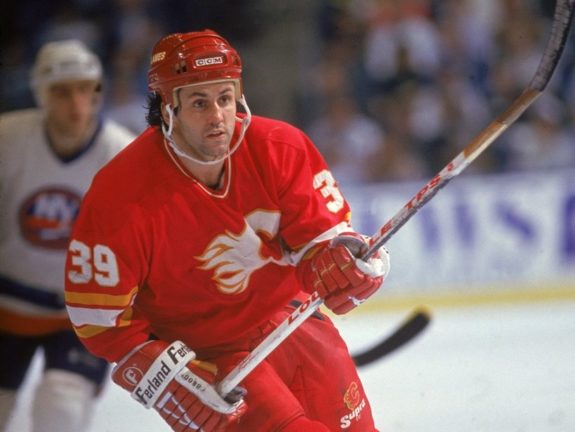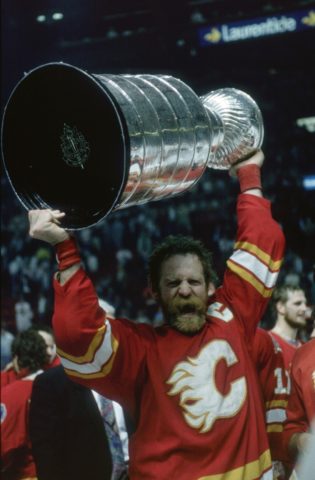The 1988-89 Calgary Flames are one of the greatest and most iconic teams in hockey history.
The team that gifted the world the iconic photo of Lanny McDonald lifting his long-awaited first-ever Stanley Cup took the league by storm, losing just six games in the playoffs. This Flames team boasted five Hall of Famers, including McDonald, Doug Gilmour, Al MacInnis, Joe Mullen, and Joe Nieuwendyk. In net, they also had two-time Stanley Cup champion Mike Vernon.
This was one of the most entertaining and complete teams in NHL history, with all three levels of their team featuring icons of the game.
Big Splash Sets the Tone
General manager Cliff Fletcher knew that the 1988-89 season was going to be special for the Flames when he pulled off one of the biggest trades in NHL history on Sept. 6, 1988. In that trade, they received future Hall of Famer Doug Gilmour, Mark Hunter, Steve Bozek, and Tim Dark in exchange for Mike Bullard, Craig Cox, and Tim Corkery.

That trade gave that Flames team, who lost in the second round the year prior, exactly what they needed to be great: a franchise centerpiece who can do it all on the ice. That franchise centerpiece wasn’t alone, however. With the loaded roster the Flames had, they dominated the regular season, going 54-17-9 (117 points), topping the Smythe Division with nearly 30 more points than Wayne Gretzky’s Los Angeles Kings.
The Flames finished second in the league in goals for with 354, 22 goals behind the aforementioned Kings. The bread and butter of that team, however, was keeping the puck out of the net. Calgary finished second in the league in goals against, allowing just 226 goals, which was eight more than the league-leading Canadiens.
The Flames’ goal scoring attack was led by Mullen and Nieuwendyk, who both finished tied for fifth in the league in goals with 51. The former was also seventh in the league in points, netting 110.
Vernon also had one of the best seasons from a goaltender that season, albeit in a league that saw Mario Lemieux score 199 points and only one goaltender top a .900 save percentage (SV%) and none topping a 2.40 goals-against-average. He finished first in the league in wins (37), fourth in the league in SV% (.897), and second in the league in GAA (2.66).
An Iconic Run to the Cup
The Flames had their toughest series in the first round, being pushed to seven games by the 33-39-8 Vancouver Canucks, who were headlined by a seven-point series by an 18-year-old Trevor Linden. The Canucks actually started this series out with an overtime winner by ex-Flame Paul Reinhart, who Calgary traded one month before the season started.
Despite the early struggles, the Flames didn’t let the series get away from them, winning the next two games to take a 2-1 series advantage, then trading wins for the next four games before winning the series in seven games. Joel Otto put the Canucks to bed win an overtime winner in Game 7 to win the series.
Otto was tied for the team lead in points for that series with nine, with Hakan Loob tying that total. Loob also had the most goals in that series, scoring five, but Otto had the most important goal to set up a second-round series against Gretzky’s Kings.
The Flames held the Kings in check, sweeping them despite a nine-point effort from The Great One. Calgary’s big guns came to play to match that offensive output, with Gilmour and Mullen both leading the way for the Flames with seven points in the four-game sweep.
The impressive part of that series was how the Flames held the rest of the Kings roster nearly entirely off the board. Of the Kings’ 11 goals, just two of them didn’t involve Gretzky. With the Kings’ rest of the Kings’ offensive attack silenced, the Flames were able to dispatch of them easily.
Next came the Chicago Blackhawks, who the Flames easily dispatched of in five games. The Blackhawks were headlined by a 19-year-old Jeremy Roenick, who Calgary shut down completely, only allowing him to net a single assist. In fact, the Blackhawks as a whole were held to just eight goals on the series.
Al MacInnis himself had more points than the total of goals that Blackhawks scored, netting one goal and eight assists for a nine point series, while Niuewendyk continued his goal scoring prowess, scoring four to lead the series. His four goals are more than any point total from a Blackhawks player.
An Iconic Ending
The Flames were off to battle with the Montreal Canadiens, who boasted the biggest challenge to Calgary’s chances at the Stanley Cup. They boasted a roster featuring Vezina Trophy winner Patrick Roy and a top-flight defensive tandem in Chris Chelios and Larry Robinson.

Despite that, the Flames’ offense managed to come alive, opening the series with a 3-2 victory. They subsequently dropped the next two games, including a 4-3 loss in overtime via a Ryan Walter goal, but the Flames didn’t look back from that point on.
The Flames offense torched the Habs over the next three games, outscoring them 11-6 in three consecutive victories to win the Cup, which is a very impressive feat considering the league’s best goaltender was on the other side of the ice.
Calgary’s Hall of Fame cast of characters delivered – the Flames won their first-ever Stanley Cup, and so did their captain, 35-year-old Hall of Famer Lanny McDonald.
McDonald was the Ray Bourque of his era, beloved by fans all over Canada after a seven-year run with the Toronto Maple Leafs that saw him score 219 goals and 459 points in 477 career games. He played for nine more years after that, with the last eight coming in Calgary, but the Stanley Cup eluded him.
Alas, McDonald had finally won the Cup, and it would be the last time he would grace the ice of an NHL arena. One of the most iconic moments in NHL history was birthed from this team, and that alone should earn it a spot as one of the greatest of all time, but McDonald was nowhere near alone in his efforts to capture the Cup.
MacInnis won the Conn Smythe Trophy as the Flames’ best player in the playoffs, and he clearly deserved it. He went on an absurd tear, scoring 7 goals and 24 assists for 31 points in 22 games, which is unheard of for a defenseman. Nine of those 31 points came when the Flames needed them the most, in the Stanley Cup Final, which led the team.
With Hall of Famers up and down the roster and unsung heroes like Otto and Loob pulling through throughout the playoffs, this Flames team was one of the deepest teams in NHL history and definitely has a case for being the greatest team of all time.